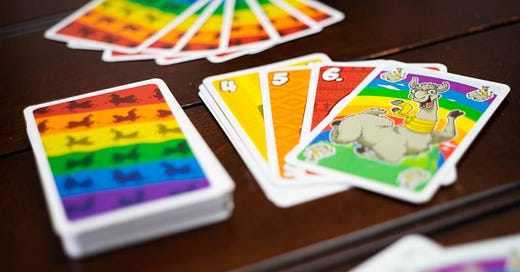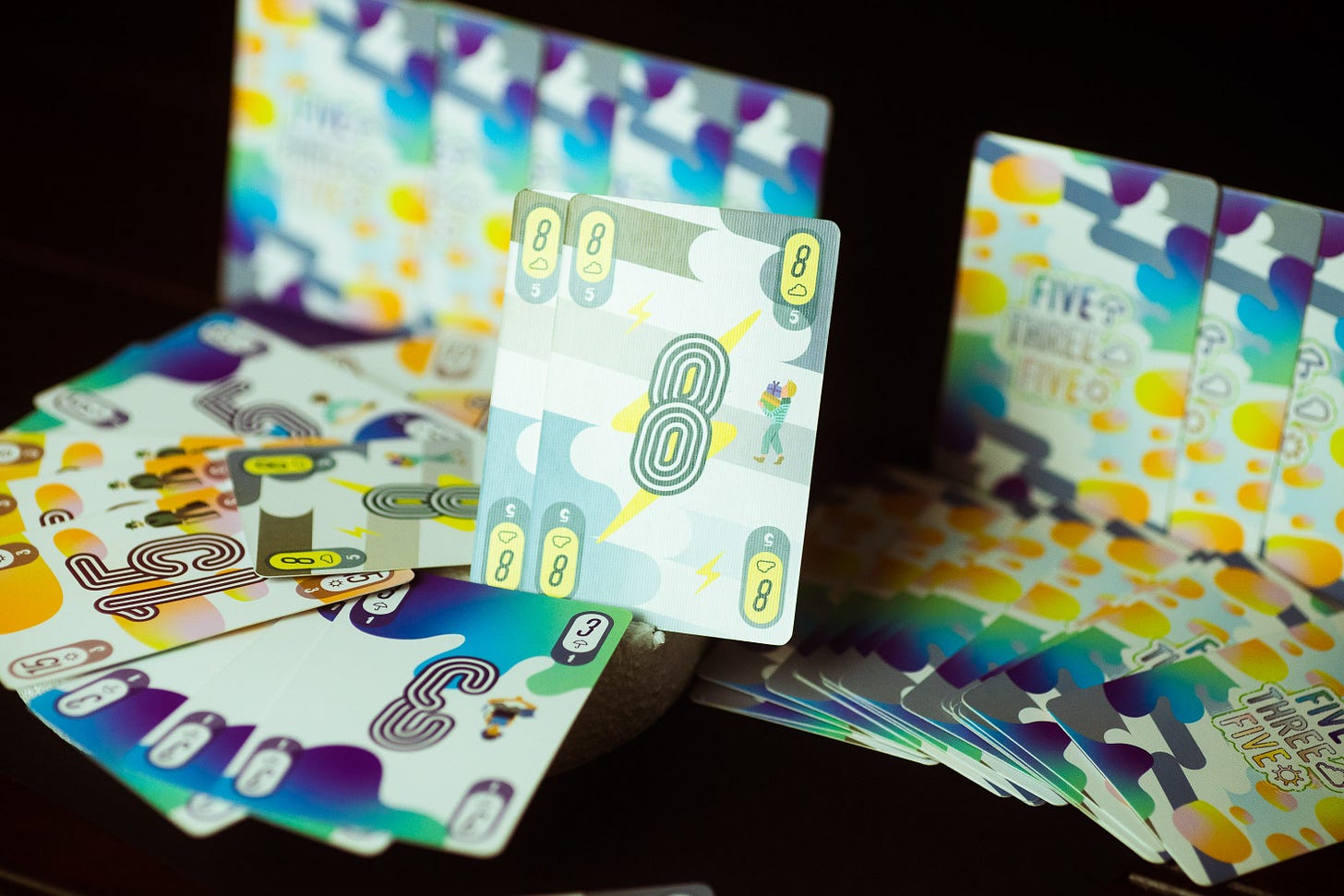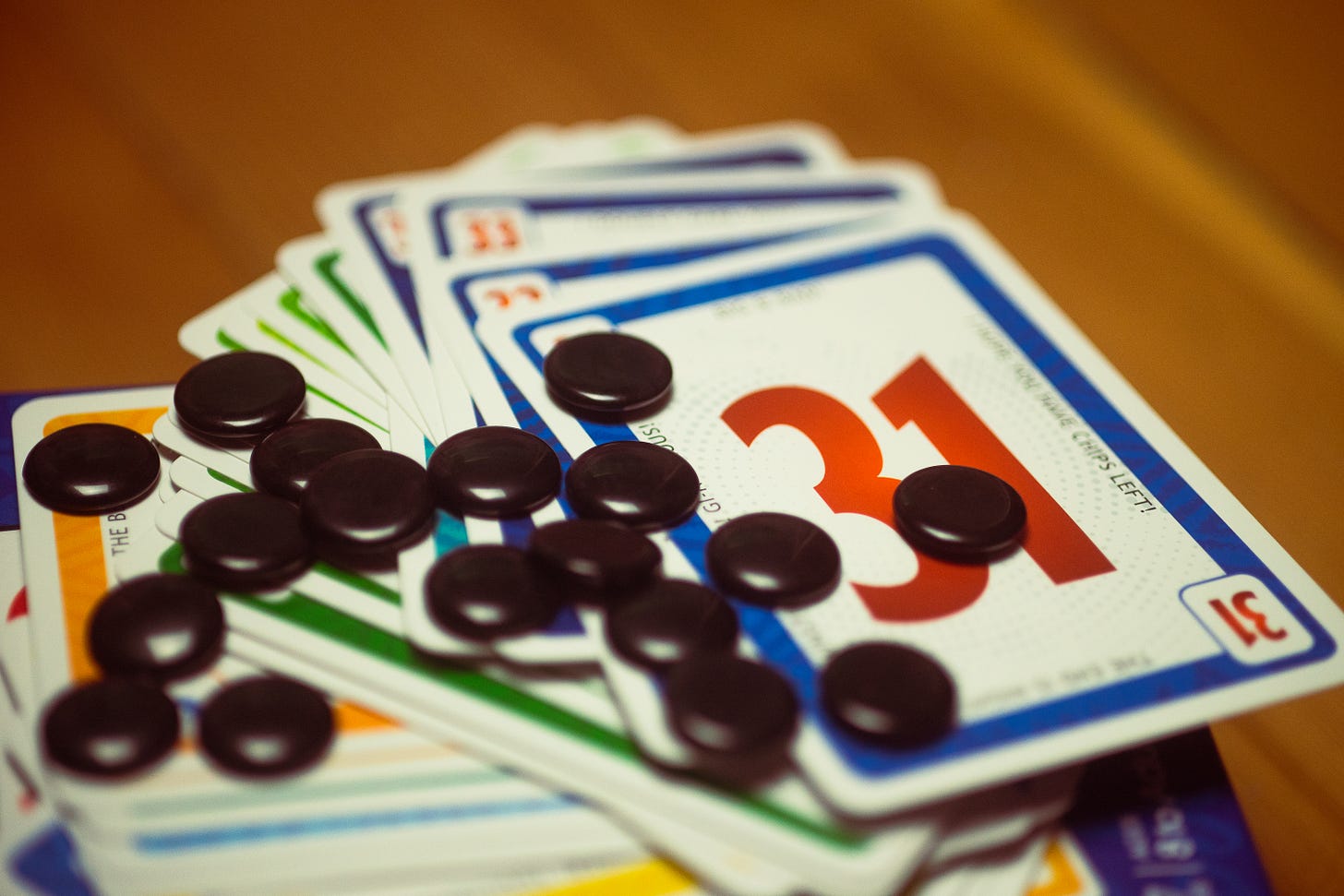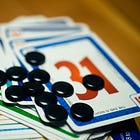As somebody who, especially as of late, has done a lot of my gaming with family, I’m here to tell you that not only are simple card games a great way to introduce people to the world of modern gaming, but they’re also great fun in and of themselves.
Too often, we see simple games and think that a simple ruleset negates the presence of fun. I’ve been there, and I understand the temptation, but there’s something impressive about a simple game that works well; there’s joy in a game with a parsimonious rule set that manages to draw you in deeply.
With that in mind, I’ve written about five of my favorite simple card games this week in Don’t Eat the Meeples. Whether you’re looking for something closer to traditional card games but with a twist (Five Three Five or Nana Toridori), something that fills that Uno vibe (L.L.A.M.A.), you want to push your luck a bit (No Thanks!), or you want a card game that tests your memory (Nana), there’s something here for you.
Five Three Five
If I didn’t know better, I’d think I only play trick-taking games and ladder-climbing games. I certainly do play a lot of those, and this game does nothing to show that I play other games. I don’t mind that. Kenichi Kabuki’s Five Three Five, published in the United States by Portland Game Collective, is a ladder-climbing game in which, you have the opportunity to add a card to the active meld (a meld is either an individual card, a set, or a run) on the table — extending runs, adding cards to sets, and turning singles into sets or runs gives you a set of options every turn, in addition to playing stronger melds.
This one has a real charm because of that ‘add to melds’ aspect, but there’s a little bit more of a twist. First, sets are outranked by higher-number sets, while runs reverse that idea, with lower cards outranking (say, a 1-2-3 run) beating higher cards (in this case, let’s say, a 11-12-13). Oh, and the 6 and 10 cards? No, your game wasn’t misprinted — they just aren’t in the deck at all. That’s the name coming out — five cards (1–5), a gap, three cards (7–9), a gap, then five cards (11–15). And finally, the 8 — that card smack dab in the middle of the deck — has an additional rule: If you play a meld containing an ‘8’ atop another meld, you’ll immediately clear the meld and lead the next trick.
Five Three Five on BGG | Buy at Portland Game Collective
L.L.A.M.A.
Designed by the eminent Reiner Knizia, L.L.A.M.A. sees players trying to rid their hand of cards in a simple ladder-climbing scheme. With only cards numbered one through six as well as some llama cards, you’ll either be playing a card, drawing a card, or passing for the round. The fun twist here is that you’ll be playing cards that are higher than the ones played before, with llama cards going atop sixes, and ones going atop llama cards. Each round, you’ll score points equal to the cards left in your hand, with even more points given for llama cards left. As you may have guessed, points are bad here.
Surprise — it’s another climbing game of a sort. It’s a very simple climbing game, but there’s a reason L.L.A.M.A. is often seen as a great replacement for Uno. Will you be the first to go out?
L.L.A.M.A. on BGG | Widely available for purchase
No Thanks!
One of my absolute favorite games to introduce to groups of non-gamers is No Thanks!, a simple push-your-luck game designed by Thorsten Gimmler. In this 2004 release, you’re basically trying not to take cards, dropping one of your tokens on the active card and issuing a stern (or silly, I don’t think it matters) “No thanks.” You don’t have that many tokens, though, and at some point, you will take a card and the tokens on it, giving you both points (which you don’t want — a common theme here, I guess!) and more tokens with which you can declare your desire to not take cards.
The big twist: If you have an uninterrupted sequence of cards, you’ll only earn points equal to the lowest card in the sequence. However, there are cards removed from the deck randomly each time you play, rendering the temptation to just take every card you find a disastrously bad idea.
I wrote about this game a while ago, and I still absolutely adore it.
No Thanks! on BGG | Widely available for purchase
Nana
If you’re up for importing a game from Japan (or picking it up from an importer!), Nana, designed by Kaya Miyano, is a great option. This is a game of forming up to three sets of three identical cards by asking players for their highest or lowest card, one by one. You win if you manage to reveal three sets of cards, or two sets of cards that either add or subtract to seven (nana being ‘seven’ in Japanese), or revealing a set of sevens.
On your turn, you’ll get to ask for a single player’s lowest card or their highest card (and you only ever have those two options), or you may flip over a card in the middle of the table. There are three each of cards numbered 1 to 12, so there’s no wiggle room in finding those cards around the table. After each reveal, if you haven’t revealed a card that doesn’t match the first, you’ll get to do it again. If you manage to reveal the three matching cards, great! You’re one step closer to victory. But wait, you might be asking: What about the cards in my hand? Well, they can be revealed by ‘asking’ yourself to reveal your lowest or highest card, limiting your own options in the same way as everyone else at the table.
It’s a simple premise, and it takes just a minute to explain, but there are legs here. It’s not going to tax your thinking, nor is it going to take more than 15 or 30 minutes to play. I also can’t guarantee you’ll have fun playing, because that’s truly up to you, but I can say that I’ve had a lot of fun every time this hits the table.
Nana on BGG | Buy at Tricky Imports
Nana Toridori
Unrelated to Nana, Nana Toridori is a Japanese ladder-climbing game with an importantly small ruleset. With cards numbered 1 to 7, you’ll have a hand of cards that you can’t rearrange. One player will lead with a set of identically numbered cards (a set of one card is acceptable), and subsequent players follow with a set that is stronger, either by playing a set with the same number of cards but a higher value or by playing a set with more cards of any value. If you’ve played a stronger set, you can choose to take the set you’ve beaten into your hand, putting it anywhere in your hand. If you can’t play a set, you must draw a card, placing that anywhere in your hand. That gives you an opportunity to strengthen your hand, and although your goal is to not be the last one out, taking more cards often puts you in a better position to shed out.
A fun twist here is that only one player loses in Nana Toridori. Each player has two penguins, and if everyone sheds their hand but you, you’ll lose one of those penguins. If you lose both, you lose, and everyone else wins.
Designed by Toshiki Arao, Nana Toridori is a riff on his design Hachi Train. This one particularly is cited as simpler alternative to the great ladder-climbing game SCOUT, a 2022 Spiel des Jahres nominee. While I prefer to let both stand alone in evaluation, I also understand the argument — and this one is certainly a simpler game to explain, though neither is difficult to grasp.
Nana Toridori on BGG | Buy at Tricky Imports
As always, thank you for reading Don’t Eat the Meeples! I love writing this every week and sharing it with you. I’m always looking to expand what my coverage, so if you’ve got something in mind that you’d like to see, drop a comment below.
Next week: We’re taking a look at some of the great word games out there as we look to replace Scrabble.









CARD GAMES! the best kinda games